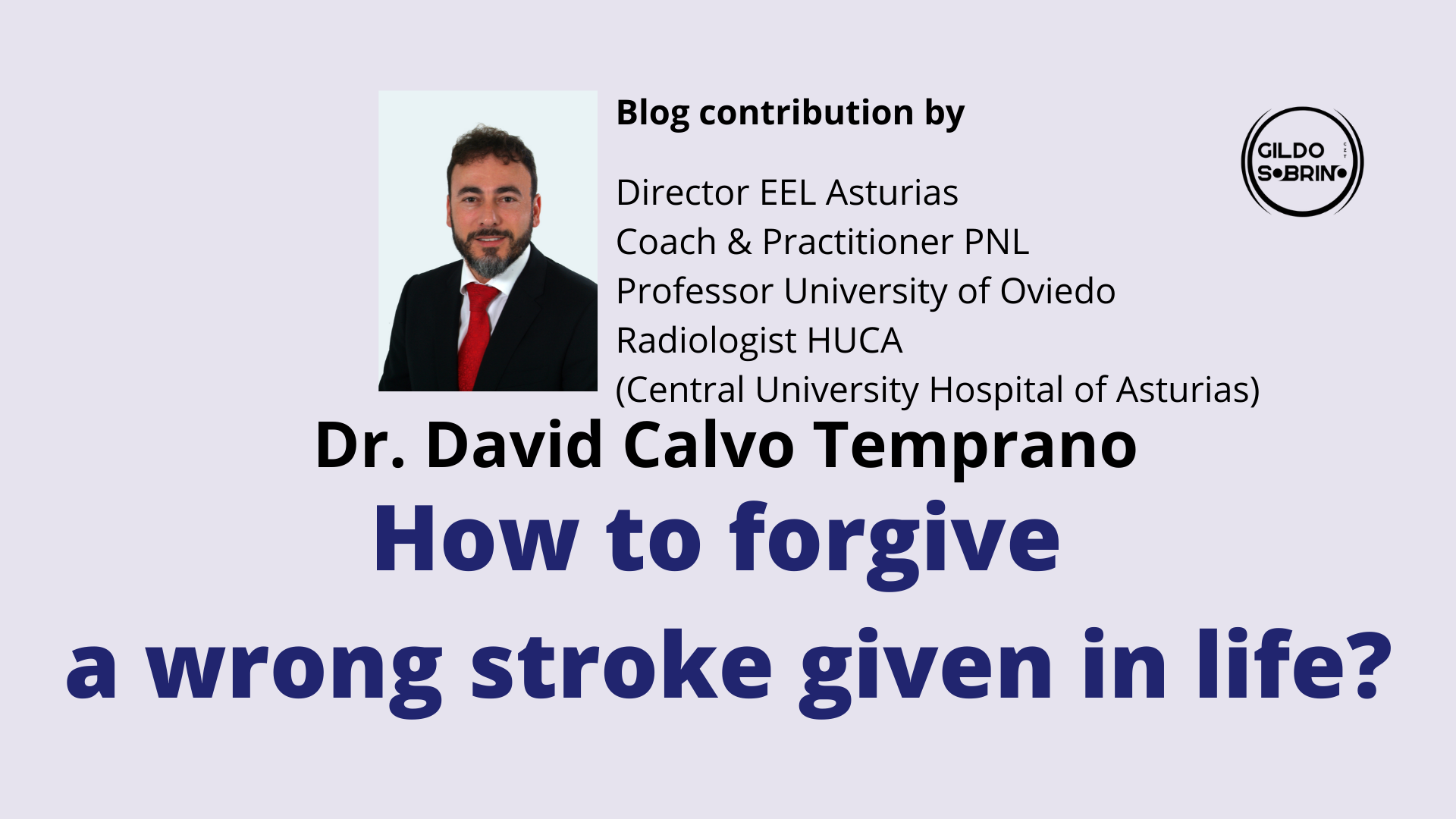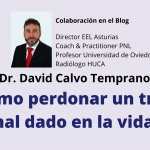How to forgive a wrong stroke given in life?
Today I have the pleasure of having a very special collaboration. Since I decided to have my own website, with an active blog. I thought about giving voice to people who can bring us ideas, experiences or knowledge, in line with what Zentangle® represents. Personal growth and inner peace.
It happens that in May 2021 I was invited to write about Zentangle in the Blog of the Cancer Coach Dr. David Calvo Temprano. So it is no coincidence that the first Guest Blogger is him. It is always a pleasure to listen to him and in this case to read him.
This time he talks about Forgiveness, that necessary capacity to be at peace with oneself and the environment, but that we find so hard to apply. In Zentangle we learn to forgive ourselves for the strokes that are not perfect.
Dr. David Calvo Temprano will help us to go one step further and transfer it to our daily lives.
At the end of the article I will add links to both the aforementioned article on Zentangle in his Blog, as well as his interventions.
I leave you in the best hands, I hope you enjoy his contribution.
How to forgive a wrong stroke given in life?
LIFE, THAT TILE IN WHICH EVERY STROKE COUNTS IN ORDER TO MOVE FORWARD:
If life were a tile, and every stroke counted when experiencing another step in life, we would surely see many mistakes on that «canvas». Many of our strokes and those of others were not «apparently» perfect and artistic; and they would seem to be a disruption in the image we had in mind, either by unconscious error or by lack of artistic ability to capture it.
This can be a good expression of how we see a mistake we have not yet forgiven in the other or in ourselves. In the Zentangle® philosophy, «wrong» strokes should not be corrected, but should be consciously constructed from each stroke, no matter whether it was intended or came out that way for any reason. It is the same in life: many times we are presented with mistakes that we did not expect, that affect us deeply, and that we believe prevent us from continuing to «draw» our life tiles without putting our focus on that mistake.
RESENTMENT, THAT HIJACKING OF OUR LIVES TO WHICH WE CLING LIKE SLAVES:
We know that, if we do not forgive, the stroke will remain in our possession, it will remain on the canvas, and it will also continue to hijack – consciously or unconsciously – our vital energy, our attention and our time; those that we consider so sacred, we will be wasting them precisely on what we have categorised as » mistake «, but it gets the better of us.
When we have a past event that we do not forgive, whether it is our own or someone else’s, we are betting on the constant struggle to keep our attention on it, rather than devoting that energy to living life independently of it. That is precisely why resentment is the emotion that is constantly felt and resented without being able to move forward, because of the ballast that this bad-tragedy represents in one’s life; without realising that it is oneself who chooses what to pay attention to and what to accept as a past event and with which one can continue living the present if one so chooses and decides.
When we ask ourselves what things make us lose our harmony, our peace, our vital balance, there are always «culprits» to blame for what we do not want: «guilt». It seems that «guilt» is something real, that it has a real existence and a real nature, doesn’t it? So how is it not felt when the event is still happening, but we manage to make a healthy choice and forgive it? What appears to be so difficult – as we believe FORGIVING to be – turns out to be simply a sign of coherence and intelligence: we forgive in order to be able to continue living in peace; to be able to bring our love and joy to the life we value; to stop wasting life, time and energy on what we say we don’t want; and above all, we forgive because we have already learned to love ourselves so much… so much, that we no longer accept self-created ballast, invented limits, for which our mental chatter demands us to constantly judge, without leaving us «in peace».

THE VISION OF THE RESENTFUL: GUILTY, EXHAUSTING AND DEHUMANISING.
When we are stuck in a resentment, we see the guilty person in a dehumanised way. Suddenly, all the nice things we might have seen before about that person are gone, we have overlooked them. Our focus is only on maintaining and defending a growing list of resentment, which, if he or she does not ask for forgiveness, we will not release, but even if he or she does ask for it, we may not grant it, and continue to suffer, when we could release ourselves by saying, «OK, I didn’t like it, and I still see it the same way, but that’s it, it happened, and I want to move on; I don’t need to deny it or hide it; I don’t want to live against it; I want to live for all the wonderful things that are in my present and are yet to come».
WE DO NOT FORGIVE IN ORDER TO BE RIGHT THAT THIS SHOULD NOT HAVE BEEN THE REALITY:
If forgiveness proves so valuable, how come it seems so difficult to give? What prevents us from forgiving? The desire to BE RIGHT. We have been taught, wrongly of course, that if we grant forgiveness – to others or to ourselves – it is «as if it didn’t happen, as if it didn’t take place». This is not the case. For example, in an emotional break-up, one person can forgive another and not go back to the person. What differentiates the one who forgives, from the one who does not, is that he finds peace for himself, and can go on with his life in harmony with it, even if he still does not like that it happened.
We tend to believe that we don’t forgive because a certain thing happened, but the reality is that we resent not the fact that it happened (which was real), but the belief that it shouldn’t have happened. We have, sort of, a code of law in our mind (taught to us by others) that dictates to us what we should go against and what is right in each case. We are trained to «have judgement», but that judgement changes from person to person, changes from time to time and changes from place to place; so «having judgement» is more volatile than an autumn leaf when it turns brown and forgets its greenness.
THE REAL PANDEMIC: RESENTMENT AGAINST REALITY.
The cause that leads to THE ILLNESS OF SUFFERING through resentment, and which can even be as chronic as a lifetime, is simply placing more value on being in the right, than on being at peace. And, moreover, the craziest thing of all (but we don’t know it, or didn’t know it before): that it is not even seeking reason in one’s own authentically held, consciously chosen belief, but in the degree of coherence with that famous code of law that we have been so dysfunctionally taught by our ancestors (as misguided and misinformed as we are ourselves).
When I put the code of arbitrary judgement first, every time I judge, someone is condemned. And of course, we don’t want to be condemned, so we often «look for blame in the other», even when sometimes others could easily see that it is precisely us who do what we accuse others of. Freud called this «projection», and it is a way of defending a character we are very fond of (our personality or our self, our ego); that character we have become attached to, and which we will never get to be at peace, for it is only virtual, like the Halloween costume for a child who dresses up, but has spent too many hours making it to discard it so easily.
We assume that everyone – to a greater or lesser degree – holds, sustains and nourishes day by day one or more resentments with their past. We consider, according to the definition of health offered by the WHO already 70 years ago, that mental and social health is also health. Therefore, resentments make us unhealthy, and therefore ARE DISEASE. Ergo… if to be resentful is to be sick, and everyone assumes that they resent something… WE ARE ALL SICK of the mental and emotional (and above all social) illness of resentment, so the REAL PANDEMIC is resentment with the past.

PRACTICAL RULES FOR HEALING: THE 7 QUESTIONS OF EMOTIONAL HEALING.
There are some interesting and useful rules for dealing immediately with forgiveness that I would like to contribute:
1. Ask yourself what you want – to be right or to be at peace – when you find yourself in a conflict. Remember that if you prefer to judge and blame, you will never be at peace (how can you be at peace if there are «bad guys» around?).
2. Ask yourself how you would judge yourself if it had been you who had done or said precisely that which you attribute to your offender. It is a very revealing rule, as we are all quite aware of the fact that we are more benevolent towards ourselves than towards others (almost always), and curiously we find more justifications for ourselves, but very few for others.
3. Ask yourself if that person is happy when they did or said what you accuse them of. You will see that always, if you have clearly seen bad faith in the other, the other did not seem happy to you. And how is someone who suffers going to share something loving with you? Is it not perhaps precisely a cry for help, and you are seeing him as a «demon»? People who suffer are often the ones who hurt others the most, but maybe they are asking for help without knowing it.
4. Ask yourself if that person is still worthy of your affection, respect, affection and even your love. It is well known how we resent more often the people we say we love, and much less often the people we don’t know. And it is not just because we treat them more, but because we demand more from them. They are the ones we love the most, but also the ones we make it hardest for. If it is a person you really love, ask yourself if the unconditional love you say you have for them would not be even purer and more sincere if, in a moment of clear error (according to your criteria), you showed your most compassionate and understanding side, and offered them your love, even when they have made a mistake. A mistake can be corrected; unless you consider it unforgivable. But if you consider it unforgivable, you will never forgive him and you will NEVER be at peace. It is your choice.
5. Ask yourself if you are willing to keep your attention, your energy, your life on it and thus condition everything else you say you love more than that mistake, because you are watching to make sure that «the prisoner doesn’t get out of jail». Remind yourself of something you don’t know: The jailer is as much in the jail as the prisoner, even when he is on the other side of the bars. If the jailer has to make sure that the prisoner serves his sentence, that jailer will have no life outside the prison, and therefore, as if it were a sword of Damocles, every time we condemn, we let him «cut» our life and the life of the other we believe guilty, forever (until he is pardoned).
6. Ask yourself if you want to give more value to your mental fiction (=what should be) or to what you say reality is (=what you assume it is). Yes, I know you have never thought of it this way, but only because it is too obvious, and so our minds play tricks on us. You say you resent something that has happened, and therefore it is real. But you say that your mind (your mental law book) declares that what has already happened should not have happened. Thus forgetting that you yourself contradict yourself, for the reality is that it did happen, and therefore, questioning whether or not it should have happened after the fact is only getting you into trouble, and not allowing you to remain in harmony. The truth is that we suffer, not because of something real that happened, but because of the false fiction invented by our mind that «it shouldn’t have happened» (remember, reality has already put it there). You resent what you believe should not have been real, but reality is not there for you to judge, but for you to live and appreciate, in the best way you can and know how: maybe that’s the evolution we are playing at not wanting… some of us.
7. Ask yourself, because, if you are resentful, then you are deluding yourself. You, whether you are conscious or not, wish to be well, to be calm, to be happy, to have well-being. Everyone would subscribe to that. But you know perfectly well that, as long as you are resentful, you can never be at peace. If your life-goal is less important than holding resentment against another (who seeks better or worse for the same thing, and perhaps is as wrong as you are in the way), then you will suffer. But if you have acquired the Real Knowledge that in life you can always be at peace with whatever happens, whether you like it or not, for you do not wish to hinder yourself with judgements (of which you are not really so sure, and you change them continually!), then you will find peace where others see reasons for war. If you were given a billion reasons for war, and only one to be at peace, what would you choose? Choose peace, and appreciate no reason to lose it. Life in peace is the only Real one, for the other is not life, it is not enjoyable.
You see the best way to overcome resentment and forgive, if you look at how each of the above points begins, is to ASK YOURSELF... if that is the best way you can think of.
I FORGIVE MYSELF FOR NOT LOVING MYSELF ENOUGH TO FORGIVE MY PAST UNTIL NOW.
To forgive is to love yourself enough to not lose focus that the only thing you want is to live as well as possible, that life always offers ways to appreciate what you appreciate, to not enslave yourself in a mental prison just to make sure that the culprit does not escape, and, above all, to value reality more than the fiction that a mind tells, when it is untrained and trained in a system that has not proven to be useful to be happy, but to look for wars everywhere.
Neuroscience knows today that our brain is still programmed to survive, not to be happy; for that it will be necessary not only to transcend the inferior war-seeking reptilian brain, but the restless mental one that does not let us be calm, and reach the more evolved brain, let’s call it spiritual.
If you wish to be at peace, send your messengers of peace metaphorically, and understand that others, just like you, do not always do things in the best way, that they are wrong and confused and disoriented, because – just like you – they were not taught to be happy, but to carry out orders that they could handle better because they too were made to do the same. Either we are all guilty and irredeemably bad, or we are all innocent and unconsciously focused on the problems, instead of creating the solution by shining our light on what we do not yet see: that reality offers us what we need to transcend dysfunctional mental judgements, and make sure we are ready for the next phase of our evolution as humanity.
We still have wars under our belts (and not just rhetorical ones). The key to not placing more value on being right than on being in harmony with reality is an evidence we forget: we don’t know everything. If we did, we would probably understand that all this is FOR SOMETHING, and without a doubt, for something good: our evolution as beings of peace and love, and not of war and fear.
Everything always starts with an idea, with a dream (I have a dream)… «my» dream is that everyone is declared INNOCENT, and to correct the continuous errors of habitual behaviour or punctual conduct, but without forgetting that the collective IDENTITY is innocence, so we would never condemn anyone, other than to teach from love the consequences of the errors from their level of consciousness. If you would not condemn a small child for setting the house on fire by playing with a lighter, what makes you believe that an adult is aware of what he is doing, while he himself is no happier?





Deja una respuesta